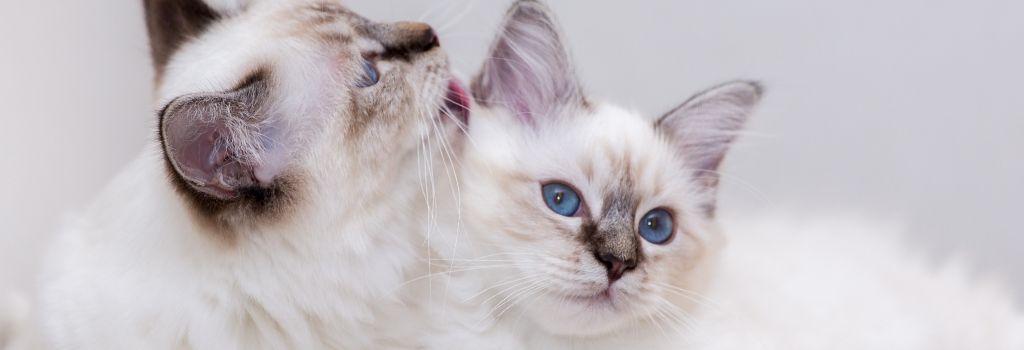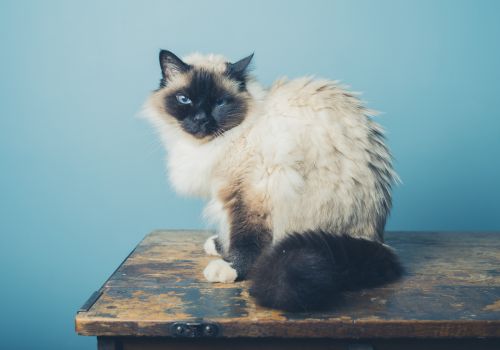The Birman cat, your charming companion who's an expert at purring their way into your heart and daily life. Also known as "Mitted Cats," Birmans are like the feline equivalent of your best friend mixed with a mystical guru. Here's a look at what makes this breed truly special and maybe even a bit mysterious!
The Adorable "Mittens"
One of the most captivating features of a Birman is their unique "mittens." These little splashes of white on all four paws make them look as if they've dipped their toes into a celestial paint pot. And the best part? They keep these darling mittens throughout their lives!
Your Daily Sidekick
Birmans are not just cats; they're companions. They thrive on social interactions and genuinely enjoy being part of your routine, whether it's helping you type emails or watching you cook. Loneliness is not their cup of tea, so they truly flourish in a home full of life, be it other pets or family members.
The Couch Potato Explorer
While many cats aspire to reach the highest peaks of your bookshelves or cabinets, Birmans prefer the down-to-earth lifestyle. You'll usually find them lounging around at ground level or sharing the couch with you. Their idea of "climbing" is probably making it to the top of a cozy blanket pile!
The Playful Lounger
Don't let their calm demeanor fool you. Birmans have a playful streak! When engaged, they'll happily chase a toy mouse or even play a game of fetch. But once the game is done, expect them to resume their favorite activity: lounging alongside you as you both enjoy some quality relaxation time.

A Mysterious Origin
The birth story of the Birman is shrouded in mist and myth. From divine temples to lost lands, there are numerous unverified tales about where they originated. What we do know for sure is that these feline enigmas arrive in this world with an all-white coat, only gaining their full spectrum of colors as they mature. Isn't it fascinating to think you're living with a little creature whose origin is the stuff of legends?
So, is sharing your life with a Birman worth it? Absolutely! With their affectionate nature, minimal grooming needs, and mysterious charm, a Birman is more than just a pet; they're a member of the family. And remember, those adorable “mittens” are not just cute—they're a sign that you're in the presence of a truly unique breed!
Genetic Predispositions for Birmans
The Silent Struggles of Cardiomyopathy
When we hear "heart disease," we often think of humans. However, our feline friends can suffer from a condition called cardiomyopathy too. This is an umbrella term that describes heart muscle disease, and it can either be inherited or result from other conditions. One of the most common forms is hypertrophic cardiomyopathy (HCM), where the heart muscle thickens, often due to an overactive thyroid gland. Another type is dilated cardiomyopathy (DCM), once linked to taurine deficiency, which is now rare thanks to improved cat food formulas.
The challenge lies in the cat's natural tendency to hide illness. By the time symptoms like rapid breathing or lethargy are noticed, the situation might be critical. Some breeds can undergo genetic testing to preemptively catch HCM. Regular vet check-ups can help detect murmurs and other signs, making early detection and treatment possible.
Arterial Thromboembolism: A Serious, Swift Issue
Cats with heart conditions like cardiomyopathy are at risk for feline aortic thromboembolisms, or FATE. In simple terms, blood clots can block the blood flow to their hind legs, leading to paralysis or severe pain. Swift medical intervention is critical. Some medications can lower the risk of clots, especially if your cat already has heart issues. So, if your cat suddenly struggles with walking or cries out in pain, it's emergency vet time, folks.

Hemophilia: The Bleeding Disorder
It might be hard to imagine, but even a minor injury could become life-threatening for a cat with hemophilia, a blood clotting disorder. There are different forms, and they can range from mild to severe. For breeds like the Birman, specialized testing is highly recommended before surgeries or dental procedures to prevent dangerous prolonged bleeding.
Know Your Cat's Blood Type
Did you know that, like humans, cats have different blood types? This knowledge becomes crucial in emergencies requiring blood transfusions. Most domestic cats have type A blood, but purebred cats often have different blood types. Having this information can save precious time in emergency situations. You can get this tested during routine vet visits, and it can even be added to your cat's microchip info.
Neonatal Isoerythrolysis: A Risk in Breeding
Planning to extend your feline family? Neonatal Isoerythrolysis (NI) is a rare but severe condition that occurs when a newborn kitten of one blood type nurses from a mother of another type. This could lead to the kitten's body attacking its own red blood cells. Certain breeds are more susceptible, so consult your veterinarian before making any breeding decisions.
Understanding Neutrophil Granulation
Don't panic if your veterinarian mentions unusual granules in your Birman's white blood cells. Unlike in other cats, these granules are typically harmless variations rather than signs of infection or disease. It's just another quirk that makes your Birman special!
Portosystemic Shunt: A Liver Condition
Portosystemic shunt is an uncommon but serious liver condition. It prevents the liver from receiving full blood supply, leading to toxic build-up in the bloodstream. This condition makes cats extremely sensitive to drugs and anesthetics. If your Birman shows symptoms like disorientation or lethargy, testing or an ultrasound scan can help diagnose this condition.

The Hidden Dangers of FIP in Cats
Feline Infectious Peritonitis, or FIP for short. Now, hold on before you let that long name scare you. FIP is a fatal disease caused by a mutated coronavirus, and it's particularly more common in Birmans than other breeds. This tricky virus can damage blood vessels and cause fluid to build up in the abdomen or chest. While blood tests are available, they're not always 100% reliable in distinguishing between the harmful and non-harmful forms of the virus. Especially if you're getting a kitten from a breeder, make sure to inquire about any history of FIP in the cattery. Unfortunately, there's no effective treatment yet, so awareness and early diagnosis are key.
Don't Turn a Blind Eye: Common Eye Problems in Cats
We all know the saying, "Eyes are the windows to the soul," but they're also essential for your cat's quality of life! Unfortunately, Birmans are prone to a range of eye issues, some of which can lead to blindness if not treated quickly. Don't worry, during every vet visit, a thorough eye exam will be performed to keep those peepers in check!
Cloudy Skies: Dealing with Cataracts
Cataracts are an all-too-common ailment in older Birmans. If you notice your cat's eyes turning a cloudy white, it's time to consult the veterinarian. While surgery is an option to remove cataracts, many cats adjust just fine to gradual vision loss. Either way, your vet will walk you through the best plan of action during your bi-annual exams.
Missing the Lid: Eyelid Agenesis Explained
Eyelid agenesis sounds complicated, but it's actually a birth defect where the upper eyelid doesn't fully form. This leaves the eye susceptible to irritation and potential blindness. Thankfully, surgical eyelid reconstruction is often an effective treatment, allowing your fur baby to blink freely and comfortably!
Corneal Sequestration: What You Need to Know
If you've got a Birman, be on the lookout for corneal sequestration. It's a painful eye condition where a hard, black patch of dead tissue appears on the cornea. While early-stage cases can be managed with topical medications, more severe instances may require preventive surgery. Keep an eye out for signs of eye infection and remember to be sure your veterinarian also checks for this during those biannual wellness exams.
A Hairy Situation: Hypotrichosis in Cats
Last but not least, let's talk about hypotrichosis, a condition that leads to thinning hair or even bald patches. This genetic defect affects several breeds, including Birmans. If your kitten has patchy hair loss, a skin biopsy can confirm a diagnosis. Though there's no cure, it's important to provide extra skincare to protect your cat's sensitive skin. And remember, since this is a genetic condition, affected cats and their relatives shouldn't be bred.
If you have questions and you'd like to reach out to us, you can call us directly at (276) 265-8183, or you can email us at [email protected]. Don't forget to follow us on social media Facebook, Instagram.

